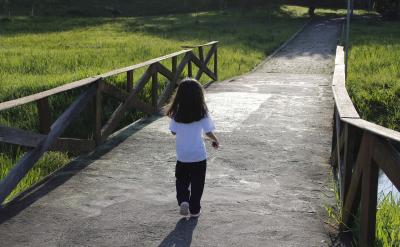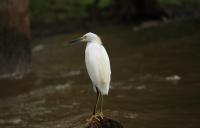人教版英语高一必修一知识点

篇1:人教版英语高一必修一知识点
人教版高一英语必修二知识点(一)
1.prefer
Prefer doing…to doing…
Prefer to do rather than do
2.advantages/disadvantages优势/劣势
2.Ever since middle school,my sister Wang Wei and I have dreamed about taking a great bike trip.从高中起,我姐姐王维和我就一直梦想做一次伟大的自行车旅行。
连词since引导的时间状语从句用一般过去时,介词since与时间点连用
It is/has been+一段时间+since+一般过去时自从……至今已经多久了。
3.persuade sb to do sth=persuade sb into doing sth说服某人做某事
4.强调句型It is/was+被强调部分+that/who
强调句型可以强调除谓语动词以外的任何句子成份。一般来说,如果被强调部分是人时,用连词that或who;如果被强调部分是物,只能用连词that。
not…until的强调句
5.be fond of喜欢,喜爱
6.Although尽管,虽然,引导让步状语从句
① although 从句多在句首,though 从句可在主句前、中、后任何位置,而且though 可以作副词用于句末,作“但是,不过”讲,而although 无此用法。
② as though(仿佛,好像),even though(即使,尽管)中不能用although。
③ though 引导的让步状语从句可以倒装(将表语、状语、情态动词后的动词原形前置到句首,此用法同as),而 although 不可以。
7.insist on doing sth/sth.一定要、坚持主张
She insists on getting up early and playing her radio loudly.
她老是一大早起来把收音机音量开大
11.care about关心 在乎
care for喜欢,照料,照顾
12.change one’s mind改变主意
13.experience经历/经验
14.Once可作为从属连词,作“一(旦)……就……”解,连接一个表示时间的状语从句。从句中常用一般现在时\现在完成时表将来。
Once you have begun you must continue.
15.give in让步 give up 放弃
16.instead of代替,而不是
17.make up one’s mind to do下定决心做某事
18.a large parcel of一大包
19.as usual像往常一样
20.put up our tent搭帐篷
21.stay awake睡不着,醒着stay up熬夜
22.for company做伴
23.lie beneath the stars躺在星空下
24.can hardly wait to do=can’t wait to do迫不及待做某事
25.go in the right direction走正确的方向
26.at a very slow pace.以很慢的速度
27.be similar to类似于
28.afford to do sth付得起,能承担
29.be tired from因……而疲劳be tired of对……厌倦
30.be in high spirits喜气洋洋,兴高采烈
31.come true实现,成真
32.give sb some advice on doing...
33.a guide to………的指南
34.on a tour在游览中,在巡演中
35.in detail详细地
人教版高一英语必修二知识点(二)
1. win, beat, defeat 表示获胜、取胜的词语
(1) win v. 赢……,获胜,接比赛或奖项 win a game / a prize / an honor / a race. / Our team won the game 8 to 7. / He won by five points. / He won her love at last. / He won the first place in the competition.
(2) beat + 对手,表打败(尤指体育比赛) I can easily beat him at golf.
(3) defeat 表战胜,接对手The enemy was defeated in the battle.
2. in the end, finally, at last
三者均可表示“(经过周折、等待、耽误)最后,终于”之意。不同的是:
finally 一般用在句中动词前面,而 at last 与 in the end 的位置则较为灵活;
三者中at last 语气最为强烈,且可单独作为感叹句使用。After putting it off three times, we finally managed to have a holiday in Dalian. / At last he knew the meaning of life. / At last! Where on earth have you been? / But in the end he gave in.
另外,finally还可用在列举事项时,引出最后一个内容,相当于lastly。 Firstly, we should make a plan; secondly, we should carry it out; finally we should make a conclu- sion.
3. by sea, by the sea, in the sea, on the sea, at sea
(1) by sea “走海路,乘船”,用来表示交通方式,同 by ship 同义。 These heavy boxes should be sent by sea.
(2) by the sea “在海边”,相当于 by (at) the seaside。The children enjoyed themselves by the sea on Children's Day.
(3) in the sea “在海里,在海水中” There are many plants and animals in the sea.
(4) on the sea “在海面上”,“在海岸边”。I want to live in a town with a beautiful position on the sea.
(5) at sea 在海上;在航海 When he woke up, the ship was at sea.
4. be afraid, be afraid to do sth., be afraid of (doing) sth.
(1) be afraid 意为“担心,害怕”,多用于口语,常用来表示一种歉意,或遗憾,后可接 so 或 not,也可接 that 从句。I'm afraid (that) 其语意相当于 I'm sorry, but...。
-- Are we on time? 我们准时吗? -- I'm afraid not. 恐怕不准时。I'm afraid you'll get caught in the rain.
(2) be afraid to do sth 常表示“由于胆小而不敢做某事”。She is afraid to be here alone. / He is afraid to jump into the river from the bridge.
(3) be afraid of (doing) sth. 常表示“担心或害怕某事(发生)”。I was afraid of hurting her feelings.
5. live, living, alive, lively
(1) live adj.
① 活的;活生生的;(只修饰生物;只作前置定语) The laboratory is doing experiments with several live monkeys.
② 实况直播的 (不是录音)It wasn't a recorded show. It was live.
③ 带电的;燃着的;可爆炸的 This is a live wire.
(2) living adj. 活着的,有生命的(作表语或定语) She was, he thought, the best living novelist in England. / The old man is still living. (或alive)
(3) alive adj. ① 活着的;② 有活力的;有生气
作后置定语:Who's the greatest man alive?
作表语:Was the snake alive or dead? / My grandmother is more alive than a lot of young people.
作补语:Let's keep the fish alive.
(4) lively adj. 活泼的;有生气的;活跃的(作表语或定语) The music is bright and lively.
篇2:人教版英语高一必修一知识点
一、单词
1、重点单词讲解。
(1)add
① add …to… 把…添加…/把…加起来
② add up to 共计,总共
③ add to 增添
(2)upset
过去式:upset 过去分词:upset 现在分词:upsetting
adj.心烦意乱的,不安的,不适的
be upset about/over 为某事心烦、不安
be upset that 心烦
vt.使不安,使心烦
It upsets sb that 让某人心烦的是
It upsets sb to do sth 做某事使某人不安
(3)concern
vt. 使担心,顾虑,涉及,关系到
n. 担心,关注,利害关系
①as far as sb/sth + be concerned 就某人而言,对于某人来说
as far as I am concerned 就我而言,对于我来说
as far as he is concerned 对他来说
as far as English is concerned 关于英语,对于英语
②be concerned about/for 关心,挂念
have no concerned about/for
③be concerned in/with 涉及到,与…有关
have no concerned in/with
(4)go through
①经历,遭受,忍受 go through one difficulty after another.经历一个又一个困难。
②仔细检查,审查 go through your paper 检查你的试卷。
③浏览,翻阅 go through all the related reference.浏览相关资料。
④通过,穿过=pass through go through a great forest.穿过一片大森林。
⑤完成 go through the task.完成任务。
(5)suffer
①suffer 作“遭受”时,后面直接接pain, loss, injury, harm或 punishment.
②suffer 作“受…苦”时,常常搭配:suffer from
(6)get/be tired of 厌烦…
get/be/feel tired of sb / sth / doing sth 厌烦
be tired from 由于…而疲劳(体力上的疲劳),侧重原因
be tired out 精疲力竭的
(7)join in 参加,加入
区别join ,join in ,attend 与 take part in:
join:多指加入组织,团体,党派等,有作为其中一员的意思。例:join the army 参军
join in:参加某项游戏,活动,讨论等。常用结构:join sb in
例:Will you join us in a walk?
attend:参加会议,婚礼,葬礼,上课,讲座,听报告等。
例:attend a lecture 参加一个讲座。
take part in:多指参加群众性的活动,运动,战争等。
例:take part in the march.
二、句子
(1)I wonder if/weather …我想知道是否…
(It’s) no wander if/weather…不足为奇,难怪。
It’s a wander if/weather that… 令人惊奇的是…
(2)强调句型的构成:it is/was…+被强调部分+that+ 其他成分
(3)It is/was the first time /second…+ time that…这是第一次/第二次…
注意:that 从句中的时态必须用完成时。如果前面是is,that从句中则用现在完成时;如果前面是was,that从句中则用过去完成时。
(4)in order to 以…为目的,用于引导目的状语,放在句首或者句中。
否定形式:in order not to
句式转换:in order to=so as to do (只放在句中)
=in order that+句子 (只放在句中)
=so that+句子(只放在句中)
三、本单元交际项目的重点是在与他人讨论问题时,如何友好地表达同意或不同意。
(1)表达同意的句子。 (2)表达不同意的句子。
Exactly.确实如此。 No way.没门儿。
No problem.没问题。 Of course not.当然不。
That’s right/true.那是对的。 I don’t agree (with you).我不同意。
Yes, I think so.对,我认为是这样。 No, I don’t think so.不,我不这么认为。
All right./OK.行,可以。 I’m afraid not.恐怕不是。
I believe (guess, hope) so. I don’t think it’s very practical.
我相信(猜想、希望)是这样的 我认为这不切实际
That’s a good idea.那是一个好主意。 I can’t accept that. 我不能接受。
I agree (with you).我同意。
篇3:人教版英语高一必修一知识点
1.人教版高一英语必修三语法知识点 篇一
一、主语
主语是句子陈述的对象,说明是谁或什么。表示句子说的是"什么人"、“什么事”、“什么东西”、“什么地方”等等。
名词、代词、数词、动名词、To do不定式、一个句子 都可以做主语。
二、谓语
谓语是对主语动作或状态的陈述或说明,指出“做什么”、“是什么”或“怎么样”. 谓语动词的位置一般在主语之后。
三、宾语
宾语,又称受词,是指一个动作(动词)的接受者。宾语分为直接宾语和间接宾语(间接宾语也称宾语补足语)两大类,其中直接宾语指动作的直接对象,间接宾语说明动作的非直接,但受动作影响的对象。一般而言,及物动词后面最少要有一个宾语,而该宾语通常为直接宾语,有些及物动词要求两个宾语,则这两个宾语通常一个为直接宾语,另一个为间接宾语。名词、代词、数词、动名词、To do不定式、一个句子 都可以做宾语,而to do不定式用于宾语补足语。
四、定语
定语是用来修饰、限定、说明名词或代词的品质与特征的。 主要有形容词此外还有名词、代词、数词、介词短语、动词不定式(短语)、分词、定语从句或相当于形容词的词、短语或句子都可以作定语。 汉语中常用……的表示。定语和中心语之间是修饰和被修饰、限制和被限制的关系。在汉语中,中心语与定语二者之间有的需要用结构助词“的”,有的不需要,有的可要可不要。 “的”是定语的标志。
2.人教版高一英语必修三语法知识点 篇二
被动语态的构成
被动语态的形式是由“助动词be+动词的过去分词”构成。助动词be随着主语的人称、数、时态等的不同而变化。几种常见时态的被动语态形式如下:
1. 一般现在时 am/is/are + 过去分词
例如:Rice is planted in the south of China.
2. 一般过去时 was/were + 过去分词
例如:These trees were planted the year before last.
3. 一般将来时 will/shall + be + 过去分词
例如:A sports meeting will be held next week in our school.
4. 现在进行时 am/is/are + being + 过去分词
例如:Your radio is being repaired now.
5. 过去进行时 was/were + being + 过去分词
When he got there, the problem was being discussed.
6. 现在完成时 have/has + been + 过去分词
His work has been finished.
Has his work been finished? Yes, it has. / No, it hasn’t.
3.人教版高一英语必修三语法知识点 篇三
feeling very frustrated 现在分词在句中作伴随状语
eg.She sat on the chair reading a newspaper.(表伴随)
Walking in the street, she met her old friend.(表时间)
Seeing no body at home , she decided to eat outside.(表原因)
Eg.She ought to look after her child better.
You ought to study hard to get a high mark.
4.人教版高一英语必修三语法知识点 篇四
一、将来完成进行时
1.概念:表示动作从某一时间开始一直延续到将来某一时间。是否继续下去,要视上下文而定。
2.基本结构:shall/will have been doing
3.例子:I shall have been working here in this factory for twenty years by the end of the year.到今年年底,我将在这个工厂工作了。
If we don't hurry up the store will have been closing before we get there. 咱们如不快一点儿,等我们到了那儿,店门就会关了。
二、 过去将来完成进行时
1.概念:表示从过去某时看至未来某时以前会一直在进行的动作。
2.基本结构:should/would + have + been +现在分词
3.例子:He told me that by the end of the year he would have been living there for thirty years.他告诉我,到年底时,他就在那住了了。
5.人教版高一英语必修三语法知识点 篇五
the most commonly used and simplest holiday greetings are, as you might expect:
1. happy new year!
2. best wishes for a happy new year.
3. may your new year start out joyful!
4. good fortune and success in the new year!
5. may the season's joy stay with you all year round!
6. may joy and happiness surround you today and always!
7. even though we're apart, you're in my heart this new year's season.
8. wishing you peace, joy and happiness throughout the coming year.
篇4:人教版英语高一必修一知识点
Unit 1
survey 调查;测验
add up 合计
upset adj. 心烦意乱的;不安的,不适的
ignore不理睬;忽视
calm vt.&vi.(使)平静;(使)镇定 adj.平静的;镇定的;沉着的
calm(...)down (使)平静下来
have got to 不得不;必须
concern(使)担心;涉及;关系到 n. 担心;关注;(利害)关系
be concerned about 关心;挂念
walk the dog 溜狗
loose adj 松的;松开的
vet 兽医
go through 经历;经受
Amsterdam 阿姆斯特丹(荷兰首都)
Netherlands 荷兰(西欧国家)
Jewish *人的;*族的
German 德国的;德国人的;德语的.
Nazi 纳粹党人 adj. 纳粹党的
set down 记下;放下;登记
series 连续,系列
a series of 一连串的;一系列;一套
outdoors在户外;在野外
spellbind 迷住;疑惑
on purpose 故意
in order to 为了
dusk 黄昏傍晚
at dusk 在黄昏时刻
thunder vi 打雷雷鸣 n. 雷,雷声
entire adj. 整个的;完全的;全部的
entirely adv. 完全地;全然地;整个地
power能力;力量;权力。
face to face 面对面地
curtain 窗帘;门帘;幕布
dusty adj 积满灰尘的
no longer /not … any longer 不再
partner 伙伴.合作者.合伙人
settle 安家;定居;停留vt 使定居;安排;解决
suffer vt &遭受;忍受经历
suffer from 遭受;患病
loneliness 孤单寂寞
highway公路
recover痊愈;恢复
get/be tired of 对…厌烦
pack捆扎;包装打行李 n 小包;包裹
pack ( sth ) up 将(东西)装箱打包
suitcase手提箱;衣箱
overcoat大衣外套
teenager 十几岁的青少年
get along with 与…相处.进展
gossip 闲话;闲谈
fall in love 相爱;爱上
exactly 确实如此;正是;确切地
disagree 不同意
grateful 感激的;表示谢意的
dislike 不喜欢;厌恶
join in 参加;加入
tip 提示;技巧;尖;尖端;小费 vt.倾斜;翻倒
secondly 第二;其次
swap 交换
item 项目;条款
Unit 2
subway <美>地铁
elevator n.电梯;升降机
petrol <英>汽油( = <美> gasoline )
gas 汽油;气体;煤气;毒气。
official adj.官方的;正式的;公务的
voyage n 航行;航海
conquer 征服;占领
because of 因为
native 本国的;本地的 n.本地人;本国人
come up 走近;上来;提出
apartment <美>公寓住宅;单元住宅
actually 实际上,事实上
AD 公元
base vt.以...为根据 n 基部;基地;基础
at present 现在;目前
gradual 逐渐的;逐步的
enrich 使富裕;充实;改善
vocabulary 词汇;词汇量;词表
make use of 利用;使用
spelling 拼写;拼法
latter 较后的后平的;(两者中)后者的
identity 本身;本体;身份
fluent 流利的;流畅的
fluently 流利地;流畅地
frequent adj.频繁的;常见的
frequentiy adv.常常;频繁地
usage 使用;用法;词语惯用法
command n.&vt.命令;指令;掌握
request n.&vt.请求;要求
Spanish adj.西班牙的;西班牙人的 n.西班牙人;西班牙语
dialect 方言
expression 词语;表示表达
midwestern 中西部的;有中西部特性的
eastern adj.东方的;东部的
southeastern adj.东南方的;来自东南的
northwestern adj.西北方的;来自西北方的
African adj 非洲的;非洲人的;非洲语言的
play a part ( in )扮演个角色;参与
recognize vt.辨认出;承认;公认
lorry n.<英>卡车(=<美>truck)
accent n.口音;腔调;重音
lightning 闪电
straight adv.直接;挺直 adj.直的;笔直的;正直的
block n.街区;块;木块;石块
cab 出租车

篇5:人教版英语高一必修一知识点
必修5 Unit1 Great scientists
Part 1. Warming up
1. explain 及物动词(vt.)
解释;说明;阐明[(+to)][+wh-][+(that)]
He explained that he had been cheated. 他解释说他是上当受骗了。
Can you explain how the machine operates?你能解释一下这机器是如何运转的吗?
Please explain this rule to me.请给我讲解一下这条规则。
不及物动词(vi.)解释;说明;辩解
I've got to explain about it. 我得解释一下此事。
2. characteristic
n. 特征;特性 Kindness is one of his characteristics.
adj. 独特的 I heard my friend’s characteristic laugh.
be characteristic of sb./sth. 是.....的特性
Such bluntness is characteristic of hin. 如此迟钝是他的特性。
3. Who put forward a theory about black holes?
put forward 提出(建议等);提名;提前,把时钟往前拨
He put forward a new plan. 他提出一个新计划。
May I put your name forward as a possible chairman of the committee?我能否提名你当委员会主席?
[归纳拓展]
put down 记下;镇压 put out 关掉;熄灭
put aside 放在一边;储存;保留 put off 推迟;延期
put up 建造;举起;张贴 put on 穿上
put away 收好
选词填空
(put off, put up, put forward, put aside, put out)
①The plan that you _____ at the meeting is wonderful.
②Many tall buildings were _____ along the road.
③Firefighters have been called to _____ the fire in the city center.
④He has a little money to _____ for a rainy day.
⑤Don’t _____ until tomorrow what can be done today.
Part 2. Pre-reading, reading and comprehending
1. Do you know how to prove a new idea in scientific research
how to prove a new idea 为“疑问词+不定式”结构,该结构可在句中作主语、宾语、表语等。
We haven’t decided where to go. 我们还没有决定去哪里。
The question is when to leave. 问题是什么时候动身。
2.draw a conclusion 得出结论
1)conclusion作名词,意为―结束,结论‖
come to/reach/arrive at a conclusion 得出结论
in conclusion 后
I will in conclusion say a few words about my visit to Tokyo.后,我对我的东京之行说几句。
2)conclude作动词,―结束;断定;决定‖。to conclude(作插入语)后,作为总结(= to sum up)
To conclude, I think smoking does more harm than good to us.
3.John Snow was a famous doctor in London — so expert, indeed, that he attended Queen Victoria as her personal physician. 约翰·斯诺是伦敦一位的医生——他的确医术精湛,以至于成了照料维多利亚女王的私人医生。
expert
① n. 专家,能手 an expert in psychology(心理学) an agricultural expert
② adj. 熟练的,有专门技术的
an expert job需专门知识的工作
He is expert in / at cooking.
attend vt. &vi 参加,注意,照料
① be present at参加attend a ceremony / lecture / a meeting
② attend to (on): to look after, care for, serve伺候, 照顾,看护
The queen had a good doctor attending (on )her.
Dr Smith attended her in hospital.
Mother had to attend to her sick son.
③ attend to处理,注意倾听
Can you attend to the matter immediately?
I may be late – I have got one or two things to attend to.
4. But he became inspired when he thought about helping ordinary people exposed to cholera. 但当他一想到要帮助那些得了霍乱的普通人时,他就感到很振奋。
(1) exposed to cholera 在句中是过去分词作后置定语,表示被动。意为―患霍乱的‖。如: The book written by Luxun is very popular. 鲁迅写的书是很受欢迎的。
The man seen by us yesterday is Professor Smith. 昨天我们看见的那个人是史密斯教授。
(2) expose
①暴露 expose sb/sth to sth He exposes his skin to the sun. 他把皮肤暴露在阳光下。 ②揭露He exposed their plot. 他揭穿了他们的阴谋。
The crime of the corrupt officials must be exposed without any reserve. 对贪官污吏的罪行一定要毫无保留地予以揭发。
exposed adj. 暴露的,暴露于风雨中的,无掩蔽的 exposedness n. 暴露,显露
expose sth. to the light of day 把某事暴露于光天化日之下
expose a fraud 揭穿骗局
练习:The disc, digitally _____ in the studio, sounded fantastic at the party that night.
A. recorded B. recording C. to be recorded D. having recorded
5.Neither its cause nor its cure was understood. 对于它的起因和治疗方法人们都不清楚。 neither...nor...既不……也不,连接句中两个相同成分。
①I neither knew nor cared what had happened to him.我既不知道也不关心他出了什么事。 ②Neither France nor Britain will attend the meeting next week.法国和英国都将不会参加下星期的会议。
③Neither Jim nor his parents have seen the film.
=Neither his parents nor Jim has seen the film.吉姆和她的父母都没有看过这部电影。 cure vt. 治疗,治愈,改正 n. 治疗,治愈,治疗法
①cure sb(of sth)治好了某人(的...,...)
The only way to cure backache is to rest. 治疗背痛的办法是休息。When I left the hospital I was completely cured.
That nasty shock cured him of his inquisitiveness for ever. 那一沉重教训根除了他凡事爱打听的毛病。
This illness cannot be cured easily. 这种病不好治.
②a cure for sth.治疗…的方法;解决问题,改善困境
Is there a certain cure for cancer yet? 癌症迄今有无有效的治疗方法?
The prices are going up every day, but there is no cure for rising prices.
6.So many thousands of terrified people died every time there was an outbreak.人们既不知道它的病因,也不懂如何治疗。每次爆发霍乱时就有成千上万惊恐的人病死。
(1)本句为复合句,―So many thousands of terrified people died‖ 为主句,every time引导时间状语从句,意思是―每当……‖。
(2)有些名词短语或副词可以起连词的作用,引导时间状语从句。例如:every time,each time,the last time,next time,the moment,the minute,immediately,instantly等。 ①Every time/Each time I express an opinion,she argues back.每当我发表意见时,她总是反驳。
②I found myself in an entirely new world the moment/the minute/immediately I arrived here.我一到这里就感到耳目一新。
③The last time I saw him,he was quite well.我后看到他时,他还相当健康。 ④Give your father my best regards next time you see him.下次你见到你父亲时,请代我向他致以好的问候。
[拓展延伸]
(1)for the first time是介词短语,常用作时间状语,而the first time是连词,引导时间状语从句。
(2)It is the first time that...如果前面用is,从句动词用现在完成时;如果前面用was,则从句动词用过去完成时.
(3)It’s (high) time that...从句动词用过去时或should+动词原形。
It’s high time we took immediate action to prevent pollution.该到我们立即采取措施阻止污染的时候了。
7.The first suggested that cholera multiplied in the air, a cloud of dangerous gas floated around until it found its victims.第一种看法是霍乱病毒在空气中繁殖,像一股危险气体在空中到处漂浮,直到找到病毒的受害人。
suggest v. 建议;暗示;表明suggest+doing / sth. / that sb. (should) do sth.
May suggested a picnic at the weekend.
He suggested to us a visit to the Great Wall.
He suggested us visiting the Great Wall.
I suggested leaving early for the airport.
He suggested that we (should) visit the Great Wall.
She suggested that her father (should) give up smoking.
*suggest (暗示,表明)+从句不用虚拟语气。
The smile on her face suggested that she agreed with me.
The look on his face suggested that he was happy.
8..The second suggested that people absorbed this disease into their bodies with their meals.第二种看法是人们是在吃饭时把这种病毒引入体内的。
absorb vt.(1)专注,聚精会神be absorbed in=put one’s heart into集中精力做某事
I was absorbed in a book and didn’t hear your call. 我正专心看书,没听到你的电话。
Absorbed in his work,Tom simply forgot food and sleep.汤姆专心工作,几乎忘记了吃饭和睡觉。
(2)吸收,把……吸收入(absorb...into...)
Black cloth absorbs light.黑布吸收光线。
The big company has gradually absorbed these small companies into its own organization.这家大公司逐渐将这些小公司吞并了。
The clever boy absorbed all the knowledge his teacher could give him.那个聪明的男孩把他老师所能教他的所有知识都理解了。
9.John Snow suspected that the second theory was correct but he needed evidence.约翰·斯诺推测第二种说法是正确的,但需要有证据。
suspect vt. 认为,怀疑
常用短语:suspect sth to be; suspect sb of doing sth.
They suspect him to be the murderer.(他们怀疑他是凶手)
She suspected him of taking her money.
n. 嫌疑犯;可疑分子[C]
10 .....,the cholera outbreak was so severe that more than 500 people died in ten days.
severe adj. 严厉地;苛刻的;严格的
be severe with/on 对....严格/严厉 You are too severe on the boy.
剧痛的;剧烈的;严重的 a severe attack of toothache 牙痛的剧烈发作
adv. severely
11.Next, John Snow looked into the source of the water for these two streets. 接下来,约翰·斯诺调查了这两条街上的水源。
look into调查,了解,研究;朝里面看
与one’s face/eyes等连用,表示“注视”
He looks into her face with great interest.他饶有兴趣地注视着她的脸。
和look组成的其他短语
look around/about环顾四周 look after照顾;照料
look back回头看 look back on 回顾;回想
look down upon 轻视,瞧不起 look for 寻求;寻找
look forward to (doing) 盼望 look on旁观
look on/upon...as把看作 look out往外看;注意;当心
look through浏览 look up抬头看;查看
look up to sb. 尊敬/仰慕某人
12. It seemed that the water was to blame.看来要归罪于饮用水了。
blame v. 责备;谴责;把……归咎于 n. 过失;责备;(过失、过错等)责任
p>①blame sb. for sth. / doing sth.为某事责备某人 / 责备某人做了某事They blamed the secretary for the delay of the plan.
② blame sth. on sb. / sth. 把某事归咎于某人;因某事而指责某人
The police blamed the traffic accident on jack’s careless driving.
③ be to blame for(doing)sth. 因(做)某事某人应该受到谴责;注意:be to blame应受责备(主动表被动);应负责任
The driver was not to blame for the traffic accident.④ accept / bear / take the blame for sth. 对某事负责任
He is ready to take the blame for what had happened.
⑤ put / lay the blame for sth. on sb. 将某事归咎于某人
13.In another part of London, he found supporting evidence from two other deaths that were linked to the Broad Street outbreak.在伦敦的另一地区,他从另外两例与布洛德街疾病爆发有关的死亡病例中得到了有力的证据。
link vt. 连接;联系n. 环;连接;联系;纽带
14.A woman, who had moved away from Broad Street, liked the water from the pump so much that she had it delivered to her house every day.一个妇女,从布洛德街搬走了,但她非常喜欢水泵的水,她让人每天从水泵给她家送水。
15. With this extra evidence John Snow was able to announce with certainty that polluted water carried the virus.利用这个额外证据,约翰·斯诺就可以很有把握地宣布污染水携带病菌。
announce vt.
(1)宣布,宣告(决定、计划等)
announce sth.(to sb.)(向某人)宣布、通告某事
announce that...宣布……;通知…… It is announced that...据宣布…
Please announce to your class that there will be no school tomorrow.请通知你们班明天不上学。
It has been officially announced that he will pay a second visit to China soon.据官方消息称,他不久将再次来中国访问。
(2)(事情)显示……;预告
The bright flowers announced that spring was here.鲜艳的花朵显示春天已经来到。
[拓展延伸] announcement n.宣布;口头通知 announcer n.播音员
make an announcement下通知
16.To prevent this from happening again, John Snow suggested that the source of all the water supplies be examined. 为防止这种情况再度发生,约翰·斯诺建议,所有水源都要经过检测。
prevent/stop...(from) doing sth. 或keep...from doing sth.意为―阻止……做某事‖
①What can we do to prevent the disease spreading.我们能做什么来防止这种疾病蔓延呢?②We should take measures to prevent the river from being polluted further.我们应该采取措施阻止这条河受到进一步的污染。
examine v. 检查;细查;诊察; 审问;盘问
The doctor examined the boy and found there was nothing the matter with him.
The lawyer examined the witness.
examination n. 考试; 检查;细查
take an examination 参加考试medical examination 体检
under examination 在检查中;在审查中
17. Finally “King Cholera” was defeated.―霍乱王‖终于被击败了。
[辨析]win, beat与defeat
win ―赢得‖赛事、战事、某物;beat ―战胜‖―击败‖比赛中的对手,可与defeat互换 We beat / defeated their team by 10 scores.
They won the battle but lost many men.
The local ball team won the state championship by beating / defeating all the other teams.
第5 / 9页
Part 3. Learning about Language
1. take in 收留;包括
take相关短语:
take after 相似
take apart把(小型机器、钟表等)拆开;拆散
take away 拿走
take back承认说错了(话),收回(诺言,话语);使回忆起;送回,还回去;退(货)
take off 脱下,脱去(尤指衣服); 解(拿)掉 --put on (反义词);(飞机等)升空,起飞 take on雇用;开始具有/ 呈现(某种品质、面貌等); 露出;接受(工作等);承担(责任等) take out带(某人)去(某处参加社交活动等);正式取得,领得,获得;洗去(污迹),使褪色 take over 接手,接任;接管
take up开始花时间从事(某项活动);对产生兴趣; 开始学习(某课程),选修;(事物或事件)占用了(时间或空间);接受的建议;继续
take …for granted 想当然认为(会是某种情况),认为……是理所当然的;认为没有问题 take …for instance / example 以……为例
take …into account / consideration 考虑到,把……考虑进去
take pride in / be proud of 为……感到自豪/ 骄傲
take revenge on 向….报复
take one's place 代替某人
take the opportunity 利用这个机会
take turns 轮流(做某事)
2. construction n.建设;建筑业;建造
He works in construction industry. 他在建筑行业工作。
There are two new hotels under construction. 有两家新饭店正在兴建。
词组扩展:construction workers 建筑工人
under construction 正在建设中
3.apart from有两种含义:
1)相当于besides.意为“除以外(还包括)”
Apart from my mother tongue, I speak several foreign languages as well.
除了母语外,我还会讲好几种外语。
2)相当于except.意为“除以外(不包括)”
I like all the subjects apart from English.除了英语外,我喜欢所有学科。
过去分词作定语
1)语法功能
过去分词或过去分词短语作定语时,其功能相当于一个定语从句。被修饰的词是分词所表示的行为的承受者;在逻辑上,它们是动宾关系。
The lecture given by Professor Zhang is about environment protection. a.单个的过去分词作定语时,位于它所修饰的名词或代词前面
the affected people受感染的人 a broken heart一颗破碎的心
a lost dog丧家之犬 a broken glass被打破的玻璃杯
Attention:过去分词修饰 something, everything, anything, nothing, somebody, nobody,those 等
第6 / 9页
不定代词时,要放在这些词后面。
Is there anything unsolved?
There is noting changed here since I left this town.
b. 过去分词短语作定语:通常后置,其作用相当于定语从句。
people exposed to cholera= people who was exposed to cholera
the book recommended by Jack= the book which was recommended by Jack
the machines produced last year= the machines which were produced last year
c. 不及物动词的过去分词作定语时不表被动,只表完成。
a risen sun已升起的太阳 the gone days 逝去的时光
fallen leaves 落叶
2)现在分词与过去分词作定语的区别:
现在分词作定语,表示正在进行的动作;过去分词作定语,所表示的动作在谓语所表示的动作之前发生,(或者没有一定的时间性)。
The letter posted yesterday will soon reach him.
Have you read the book recommended by your teacher?这是你老师推荐的书吗?
对比:
the changing world(正在变化的)the changed world(变化了的)
boiling water(正在沸腾的)boiled water(已经沸腾过的)
fading flowers(正在凋谢的) faded flowers(已经凋谢的)
a developing country(发展中的) a developed country(发达的)
a drowning man快要淹死的人 a drowned man已经淹死的人
falling leaves正在飘落的树叶 fallen leaves落叶
a retired worker退休工人 an escaped prisoner逃犯
3)及物动词的过去分词(done)与现在分词的被动式
(being done)都可以表示―被动‖,但前者多表示一个完成了的动作,而后者则表示一个正在进行的动作.
the problem discussed yesterday
the problem being discussed
过去分词做表语
1 过去分词(短语)作表语时,其作用相当于adj.,说明的是主语的状态
All the windows are broken.
All hope is gone.
He looked worried after reading the letter.
常见作表语的过去分词有: disappointed, drunk, amused, frightened, married, excited, experienced, interested, confused, pleased, puzzled, satisfied, tired, worried,gone, dressed, lost等。
注意
过去分词作表语时和动词的被动语态结构相似,但两者表达的意思明显不同,前者说明主语的特点及所处的状态,而后者强调被动的动作。
My glasses are broken.我的眼镜碎了。(状态)
My glasses were broken by my son.我的眼镜被我儿子摔碎了。(动作)
第7 / 9页
1. The disc, digitally ______ in the studio, sounded fantastic at the party that night.
A. recorded B. recording C. to be recorded D. having recorded
2. Linda worked for the Minnesota Manufacturing and Mining Company, ____ as 3M.
A. knowing B. known C. being known D. to be known
3. Most of the artists _____ to the party were from South Africa.
A. invited B. to invite C. being invited D. had been invited
4. As soon as she entered the room, the girl caught sight of the flowers ____ by
her mother.
A.buying B. being bought C. were bought D. bought
5. Don’t use words, expressions or phrases _____ only to people with specific knowledge.
A.being known B. having been known C. to be known D. known
6. The computer center,_____ last year, is very popular among the students in this school.
A. open B. opening C. having opened D. opened
7. Cleaning women in big cities get _____ by the hour.
A.pay B. paying C. paid D. to pay
8. As we joined the big crowd I got _____ from my friends.
A.separated B. spared C. lost D. missed
9. The pilot asked all the passengers on board to remain ___ as the plane was making a landing.
A.seat B. seating C. seated D. to be seating
10. Sarah, hurry up. I’m afraid you can’t have time to _____ before the party.
A.get changed B. get change C. get changing D. get to change
Part 4. Using Language
1.Although he had tried to ignore them, all his mathematical calculations led to the same conclusion.....虽然他曾经试着不去理睬那些数据,然而他所有的数字计算都得出了一个相同的结论
lead to 导致,通向
His carelessness led to the accident.他的粗心导致了这场事故。
All roads lead to Rome.条条大路通罗马。
该短语中to为介词。类似的短语还有:
be used to stick to look forward to devote onesele to pay attentio to
2.Only if you put the sun there did the movementof the other plants in the sky make sense..只有当你把太阳放在中心位置上,天空中其他行星的运动才能说得清楚。
第8 / 9页
1)句中only 修饰if引导的状语从句,放在句首时,后面的主句要用倒装。only位于句首,其后接副词或介词短语时,句子的主谓也要部分倒装。
Only then did I realize my mistake.只有到那时我才意识到我的错误。
Only in this way can you solve the problem.
2)make sense 讲得通;有道理;有意义
Here, read the sentence. It doesn’t seem to make sense.在这里,读这个句子,好像一点也讲不通。 Your story doesn’t make sense to me.你的故事对我没有意义。
3.Yet he could not tell anyone about his theory as the powerful Christian Church would have punished him for even suggesting such an idea. 然而他的这个理论不能告诉任何人, 因为即使他只暗示有这种想法,他都会受到强大的基督教会势力的惩罚。
would have done表示与过去事实相反的假设
If I had seen the advertisement, I would have applied for the job.我要是看见那个广告,我就申请那份工作了。
虚拟语气在条件从句中的用法:
If I had enough money, I would buy a car.
She would have come if we had invited her.
If it should rain/rained tomorrow, I should stay at home.
4.His friends were enthusiastic and encouraged him to publish the ideas, but Copernicus was cautious.他的朋友都热情地鼓励他把他的想法公之于众,而他却小心谨慎。
1) enthusiastic 热心的,满腔热情地 v. enthuse 热心 n. enthusiasm 狂热,热心,积极性 enthusiast 热心者,热情的人 adv. enthusiastically 热心地,狂热地
2) be enthusiastic about/over...对。。。热情
She’s very enthusiastic about singing. 她对唱歌很有热情。
be cautious about/of sb.(sth.)对。。。小心谨慎
5. complete adj.结束的;完成的;完整的 v.使完美;使完整;完成
I need one moer stamp to complete my collection.我所收集的邮票还差一张才成整套。 When will work be completed on the new road?新道路的工程何时完成?
6. reject v.拒绝;不接受;丢弃
He rejected their invitation point-blank.他直截了当地拒绝了他们的邀请。
Choose the good apples and reject the bad ones.挑好的苹果,把坏的扔掉。
7. base sth. on 把...基于
The story is based on facts.这个故事是有事实根据的。
We should base our theory on facts. 我们的理论应以事实为依据。
basis. 基础;基本 basically adv.基本上 basic adj. 基本的
篇6:人教版英语高一必修一知识点
1. be good to 对……友好
be good for 对……有益;be bad to…/be bad for…
I will be good to other people.我会善良的对待其他人.
It would be good for you to spend a holiday in the sun. 在有阳光的地方度假会给你带来很多好处。
The Olympics will be good for business. 奥运会的召开将有利于商业的发展。
be good at 擅长make good 有成就;成功as good as 实际上;几乎等于
a good deal 许多,大量 彻底的;完全的;痛快的to have a good drink 喝个痛快
2. add up 加起来
add up to 合计,总计
add… to 把……加到…… add to 增加
Add up your score and see how many points you get? 把你的分数加起来,看看得多少?
Some people can add up quite easily in their heads, but not all.
Good friends do not add up what they do for each other; instead they offer help when it is needed.
The figures add up to 270. 这些数字加起来是270。
You shouldn’t add fuel to the flame 你不应该火上加油
Fireworks added to the attraction of the festival night. 焰火使节日的夜晚更加生色。
The bad weather added to the shipwrecked sailors’ difficulties.恶劣的天气增加了失事船只的船员们的困难。
Your friend can not go until he finishes cleaning his bike.
not…until/till 意思是“直到…才”,表示主句谓语所表示的动作直到until状语所表示的时间才发生,主句的谓语动词表示的是动作的开始,动词既可以是延续性的,也可以是非延续性的。
They did not come back until eleven. 他们会在十一点后回来。
I did not notice it until yesterday.我一直到昨天才注重到它。
4. You had to pay to get it repaired
get sth done 使……完成/让某人做某事
5. You will ignore the bell and go somewhere quiet to calm your friend down.
I said hello to her, but she ignored me completely!
calm …down使平息, 使平静
calm down平息/平静下来
The crying child soon calmed down.哭闹的小孩不多一会就安静下来。
It was a long time before he managed to calm himself down. 过了很久他才努力使自己冷静下来。
We tried to calm him down, but he kept crying.
我们试图让他平静下来,但他仍不停地哭着。
6. Tell your friend that you are concerned about him. be concerned about关心,挂念
He was very concerned about his children's education. 他很关心他儿子的教育。
Please don’t be concerned about me.请别为我操心。
Why is she so concerned about his attitude to her work? 她为什么那么关注他对她的工作的看法?
7. Your friend has gone on holiday and asked you to take care of his dog.
go on holiday 度假
be on holiday 正在休假
What fun it will be when we all go on holiday together.我们大家一起去度假那可太有意思了.
take care of 爱护,照料
take care 注意,当心
You are not (physically) strong, so you may as well take care of your health. 你的体格不壮,因此注意健康。
8. While walking the dog, you were careless and it got loose. 在遛狗的时候,你一粗心松开了手中的狗链。
当while, when, before, after 等引导的时间状语从句中的主语与主句的主语一致时,可将从句中的主语和be动词省去。
walk sb home/ to a place: 为保证安全而陪某人去某地 It’s late ---- let me walk you home.
9. take one’s end-of-term exam 参加期末考试? ???
10. 3) Your friend, who doesn’t work hard, asks you to help him cheat in the end-of-term exam.(非限制性定语从句)
cheat in the exam 考试作弊
11. look at someone else’s paper 看别人的试卷
12. make a list of reasons 列举一些原因
13. Do you want a friend whom you could tell everything to, like your deepest feelings and thoughts? 你想有一位无话不谈、能推心置腹的朋友吗?
14. go through遭遇;经历;熬过;用光(钱);获准,通过
It can go through the test of the time. 它能经受时间的考验.
She knew that she had got to go through all the difficulties with her family.
He would go through fire and water for his country. 他愿为国家赴汤蹈火。
15. hide away??躲藏;隐藏16. I don’t want to set down a series of facts in a diary as most people do,…我不愿像大多数人一样在日记中记流水账,……
Why don't you set your ideas down on paper?
We have had a series of stormy days when we were on the island.
The police asked him to set down what he had seen in a report. 警察让他在报告中写下他所看见的事情。
16. I wonder if it’s because I haven’t been able to be outdoors for so long that I’ve grown so crazy about everything to do with nature. 我不知道这是不是因为我长久无法出门的缘故,我变得对一切与大自然有关的事物都无比狂热。
17. I can well remember that there was a time when a deep blue sky, the song of birds, moonlight and flowers could never have kept me spellbound.??我记得非常清楚,曾有一段时间,湛蓝的天空、鸟儿的歌唱、月光和鲜花,从未使我心醉神迷过。
18. I stayed awake on purpose until half past eleven one evening in order to have a good look at the moon for once by myself.
有一天晚上,我熬到11点半故意不睡觉,为的是独自好好看看月亮一次。
19. But as the moon gave far too much light, I didn't dare open a window.但是因为月光太亮了,我不敢打开窗户。
She speaks French far better than I, so I don't dare talk with her in French.
20. I happened to be upstairs at dusk when the window was open. 黄昏时我碰巧在楼上,那时窗户是开着的。
sth happen to sb 某人发生某事
What happened to him?
sb happen to do sth 某人碰巧做某事? ?正巧 it so happened that 。。。
It happened that he was seen by his father. = He happened to be seen by his father.
他碰巧被他父亲看见了。
As I was about to go out and search for him, he happened to come in. 正当我打算出去找他时,他恰巧进来。
The street lights go on at dusk. 街上的路段在傍晚时分亮起来。
21. It was the first time in a year and a half that I had seen the night face to face. 这是我一年半以来第一次目睹夜晚。
It is the first (second…etc) that… (从句谓语动词用现在完成时)
It was the first (second…etc) that… (从句谓语动词用过去完成时)
the first time 可作从属连词用,引导时间状语从句。The first time I saw her, my heart stopped.
It was the first time that I talked with a foreigner face to face.
I think we need a face-to-face talk so as to clear the misunderstanding.
I have often heard of her. Actually, I've never met her face to face.
22. in one’s power 处于……的控制之中
I have got him in my power. I can ask him to do anything I want. 我控制了他,我可以让他为我做任何事。
23. It’s no pleasure looking through these any longer because nature is one thing that really must be experienced.观看这些已不再是乐趣,因为大自然是你必须亲身体验的。
It’s no good/ use doing sth. 做某事时没用的。
24. She found it difficult to settle and calm down in the hiding place.
25. suffer from 患…病; 受…苦痛;遭受
Most of the important cities of the world suffer from traffic jam. 世界上大多数大城市都交通堵塞为患。
26. It was such fun to watch it run loose in the park.
27. I’ve got tired of looking nature through dirty curtains and dusty windows.
28. I need to pack up my things in the suitcase very quickly.
29. Mum asked her if she was very hot with so many clothes on.
with+名词/代词(宾格)+分词/形容词/介词短语/不定式/副词在句中常作伴随状语。动词形式的选择取决于宾语同动词之间的逻辑关系。
The murderer was brought in, with his hands tied behind his back.
30. have some trouble with sb or sth. 在……上遇到了麻烦
I have some trouble with my studies.
31. get along … with sb/sth. 与某人相处怎样/某事进展如何?
If you have some trouble (in) getting along with your friends, you can write to the editor and ask for advice. 如果你在和朋友的相处上有问题,你可以写信给编辑向他征求建议。
32. This has made me angry.
…he made her diary her best friend…
make 后接复合宾语,宾语补足语须用不带to 的不定式、形容词、过去分词、名词等。常见的有以下几种形式:
make sb. do sth.让(使)某人做某事。He was made to repeat it.(注意在被动句中,不定式前要加to)
make sb. /sth. +adj.使某人/物…We should do our best to make our country stronger and more beautiful.
make sb./ oneself +v-ed 让某人/自己被…When you speak, you should make yourself understood.
(4) make sb.+n. 使某人成为…
make it n. /adj.+(for sb.) to do sth. We made him leader of our team. (注意表示职位的名词前不加冠词)
He made it easy for us to understand the text.
33. I’m not good at communicating with people.
34. Although I tried to talk to my classmates, I still found it hard to make friends with them.
35. I do want to change this situation, but I don’t know how.
36. Mr. Jones lives alone and often feels lonely. 琼斯先生单独一人生活,常常感到孤独。
37. I would be grateful if you could give me some advice.? ?如果您给我提些建议,我会非常感谢的。??(I would be grateful if…??委婉客气提出请求)
38. join in discussions and show interest in other people’s ideas
39. It’s a good habit for you to keep a diary.? ?记日记对你来说是个好习惯。
40. Why not have a try?
41.True friends are like wine; the older, the better.
42. People are told that their actions should be as gentle as the wind that blows from the sea.
43. A friend in need is a friend indeed.
篇7:人教版英语高一必修一知识点
Unit 1 Friendship知识点主要有以下单词以及词组的用法:
1、用于表示人的性格特征的词:active, brave, careful, clever, honest, helpful,
humorous, kind, smart, wise, hard-working ,generous, selfless, easy-going, reliable, considerate, patient, sincere, responsible
2、动词及动词词组: ignore, add up, walk the do,calm … down, have got to,be
concerned about, cheat in the exam, go through, set down
3、名词:Netherlands, German, thunder, power,
4、其他词组:a series of, on purpose, in order to, at dusk, face to face, no longer
Unit 1 Friendship优秀教案:reading 部分
一 教学目标:掌握基本的阅读技能,学会在文章中找出关键信息,并能够进行文章中的
总结。
二 教学重难点:如何用英文去描述人的思想感情。
三 教学过程:
1、引入:讲解关于第二次世界大战的情况。可以用多媒体课件进行演示,让学生懂得第
二次世界大战对人类所造成的危害,给人的心理带来的影响。
2、阅读:让学生自己阅读文章,然后让学生简单描述文章中安妮的悲惨遭遇。
3、在课本上把安妮的悲惨遭遇的句子圈划出来进行分析,让学生懂得如何去进行人物的
描写。
4、难句分析:
I wonder if it’s because I haven’t been able to be outdoors for so long that
I’ve grown so crazy about everything to do with nature. 翻译:我想知道,是不是
因为这么久我不能够出门所以我就对大自然中所有的一切变得如此狂热?解释:在句子中
if引导状语从句,而because引导也是状语从句。
For example, one evening when it was so warm, I stayed awake on purpose until
half past eleven in order to have a good look at the moon by myself. 翻译:例如,有一个夜晚,天气是暖的,我故意呆在外面,直到11点半,就是为了好好地看着天上悬挂的月亮。解释:词组 on purpose意思为“故意地”,在句子中做状语。
篇8:人教版英语高一必修一知识点
1. be good to 对......友好 be good for 对......有益;be bad to…/be bad for…
2. add up 加起来 增加 add up to 合计,总计
add… to 把......加到......
3. not…until/till 意思是“直到…才”
4. get sth/sb done 使......完成/使某人被...... 5. calm down平静下来
6. be concerned about 关心 关注
7. 当while, when, before, after 等引导的时间状语从句中的主语与主句的主语一致时,可将从句中的主语和be动词省去。
While walking the dog, you were careless and it got loose. 8. cheat in the exam 考试作弊
9. go through 经历;度过;获准,通过 10. hide away 躲藏;隐藏 11. set down 写下,记下
12. I wonder if….. 我不知道是不是…. 12. on purpose 故意
13. sth happen to sb 某人发生某事
sb happen to do sth 某人碰巧做某事 it so happened that ......正巧 碰巧
14. It is the first (second…) that… (从句谓语动词用现在完成时) 15. in one’s power 处于......的控制之中 16. It’s no pleasure doing…. 做…..没有乐趣
It’s no good/ use doing sth. 做某事是没好处/没用的
17. She found it difficult to settle and calm down in the hiding place. it做形式宾语 18. suffer from 患…病;遭受 19. so…that… /such…thay…
20. get tired of…. 对…感到劳累 疲惫
21. have some trouble with sb/sth. 在......上遇到了麻烦 22. get along with sb/sth. 与某人相处
23. ask(sb)for advice. (向某人)征求建议
24. make 后接复合宾语,宾语补足语须用不带to 的不定式、形容词、过去分词、名词等。常见的有以下几种形式:
make sb. do sth.让 (使)某人做某事 make sb. /sth. +adj. 使某人/物…
make sb./ oneself +v-ed 让某人/自己被…
When you speak, you should make yourself understood. make sb.+n. 使某人成为…
25. alone /lonely. 单独的/孤独的
26. I would be grateful if… 委婉客气提出请求 27. Why not do….. = why don’t you do…

篇9:人教版英语高一必修一知识点
重点单词
hunger sunburn sunburnt struggle super
product expand circulate equip freedom
export suitable chemical confuse mineral
reduce supply bacteria graduate agricultural
whatever summary nutrition disturbing output
hobby affect level awake dangerous
farming harvest grain crop comfortable
therefore underline decade production root
statistics minerals discovery organic goal
avoid comment fertile common
重点短语
lead a … life with the hope of free from
insist on search for be satisfied with
get/feel/be exhausted in addition focus on
rid … of thanks to care about
as well as lead to build up
重点句子
1. Dr Yuan Longping grows what is called super hybrid rice.
2. The special strain of rice makes it possible to produce one-third more of the crop in the same field.
3. Dr Yuan searched for a way to increase rice harvests without expanding the area of the fields.
4. Dr Yuan is quite satisfied with his life.袁博士对生活非常满足。
5. Using his hybrid rice ,farmers are producing harvest twice as large as before
6. … planting peanuts that use the ground’s surface followed by vegetables that put down deep roots.
7. Some organic farmers prefer planting grass between crops to prevent wind or water from carrying away the soil, and then leaving it in the ground to become a natural fertilizer.
8. This also keeps the air, soil, water and crops free from chemicals.
9. In addition, fruit, vegetables and other food grown with chemical fertilizers usually grow too fast to be full of much nutrition.
10. One dream is not always enough, especially for a person who loves and cares for his people,
11. … Yuan Longping considers himself a framer, ….
篇10:人教版英语高一必修一知识点
重点单词
starve plenty satisfy feast hunt
origin trick independence gather harvest
agricultural custom admire energetic shape
religious social permission possibility grateful
apologize sadness obvious forgive decorate
award ancestor festival beauty celebrate
ancient light honor belief spirit
Christian weep wipe event sweets
poet drown heart-broken
重点短语
take place in memory of play a trick on
look forward to as though have fun with sb.
turn up keep one’s word hold one’s breath
do harm to dress up day and night
set off throw away
重点句子
1. Festivals and celebrations of all kinds have been held everywhere since ancient
times.
2. Some festivals are held to honor the dead or to satisfy the ancestors, who might return either to help or do harm.
3. It’s now a children’s festival, when they can dress up and …….
4. ….. to honor Mohandas Gandhi, the leader who helped gain India’s dependence from Britain.
5. China and Japan have mid-autumn festivals, when people admire the moon and …..
6. Some western countries have very exciting festivals, which take place forty days before Easter.
7. The country, covered with cherry tree flowers, looks forward to the end of winter and to the coming of spring.
8. She could be with her friend right now laughing at him.
9. It’s obvious that the manager of the coffee shop was waiting …..
篇11:人教版英语高一必修一知识点
重点单词
minister continent eastward surround harbor
extremely settle within border figure
terrify official wealthy distance flow
downtown tradition broad bush fall
schoolmate approximately coast measure chat
rapidly scenery manager complete aboard
nearby cowboy prize realize slightly
distant urban port fresh tour
cross confirm coast
重点短语
be/go on a trip rather than catch sight of
as well as because of go on a tour of
go through as far as be surrounded by
settle down have a gift for at dawn
be close to figure out in the distance
重点句子
1. … there was frost on the ground, confirming that fall had arrived in Canada.
2. The thought that they could cross the whole continent was exciting.
Some people have the idea that you can …., but they forget the fact that ….
3. People say it is Canada’s most beautiful city, surrounded by mountains and the Pacific Ocean.
4. It’s so wet there that the trees are extremely tall, some measuring over 90 meters.
5. The next stop was Calgary, which is famous for the Calgary Stampede.
6. The girls were surprised at the fact that ocean ships can sail up the Great Lakes.
7. … they could see the misty cloud that rose from the great Niagara Falls, which is on the south side of the lake.
As they sat in a buffet restaurant looking over the …,a young man sat down with them.
篇12:人教版英语高一必修一知识点
重点单词:
Shake
rise
burst
ruin/destroy
earthquake
injure
judge
honour
useless
imagine
shock
rescue
disaster
shelter
survivor
fresh
countryside
smelly
nervous
strange/stranger
well
pipe
event
suffering
steam
extreme
bury
canal
brick
express
dam
track
steel
mine/miner
trap
competition
organize
congratulations
重点短语:
preparetodosth/getprepared
insteadof
a/thenumberof
thousandsof
Shakehandswithsb.
Burstinto
Judgingby/from
Be/feelhonouredby
Givehonourtosb
Digout
asusual
rightaway
Beproudof
atanend
重点句子
1.Miceranoutofthefieldslookingforplacestohide.
2.Buttheonemillionpeopleofthecity,whothoughtlittleoftheseevents,wereasleep….
3.Thenumberofpeoplewhowerekilledorinjuredreachedmorethan400,000.
4.Itseemedasiftheworldwasatanend.
5.Water,foodandelectricitywerehardtoget.
句型:主语+be+adj+todo其中todo用主动形式表示被动含义
6.Allhopewasnotlost.all与not连用表示部分否定
7.It’snevertoolatetolearn.活到老,学到老。
8.Then,laterthatafternoon,anotherbigquakewhichwasalmostasstrongasthefirst
oneshookTangshan.
9.Workersbuiltsheltersforsurvivorswhosehomeshadbeendestroyed.
10.Thearmyorganizedteamstodigoutthosewhoweretrappedandtoburythedead.

篇13:人教版英语高一必修一知识点
重点单词:
Journal/journalist/journey/trip/tour(tourist,tourism)/travel/vayage/flight
fare
transport
finally
persuadecycle/recycle
stubborn
insist
attitude
camp
proper/properly
topic
familiar
prefer
disadvantage
record/recorder
flow
cousin
province
graduate
brave/bravery
schedule
detail
wool
determine/determination/determined
freeze
reliable
encourage
gradually
source/resource
inn
afford
lucky
special
temple
café
population
directions
separate
field
重点短语:
getsbinterestedin
makecamp
dreamofdoing
persuadesbtodo
persuadesbinto/outof(doing)sth
insistonsth/doingsth
putupone’stents
set/break(beat)/holdarecord
careabout
careforsth/sb
givein(tosb)
giveaway
giveoff
giveout
makeupone’smind
readone’smind
keep/bearsthinmind
befamiliarwithsth
befamiliartosb
besimilarto
重点句子
1.ItwasmysisterwhofirsthadtheideatocyclealongtheMekongRiver.
2.Althoughshedidn’tknowthebestwayofgettingtoplaces,sheinsistedthatwe(should)findthesourceoftheriver.
3.Haveyoueverseensnowmenridebicycles?(metaphor)
4.Toclimbthemountainroadwashardworkbuttogodownthehillswasgreatfun.
5.Aftergraduatingfromcollege,wefinallygotthechancetotakeabiketrip.
6.Eversincemiddleschool,…Ihavedreamedabouttakingagreatbiketrip.
7.theyareDai,…neartheLangcangRiver,theChinesepartoftheriverthatiscalledtheMekongRiverinothercountries.
Itmakeswidebendsormeandersthroughlowvalleystotheplainswherericegrows.
篇14:人教版英语高一必修一知识点
重点单词
condition welfare connection argue achieve/achievement
campaign organization specialist devote behave/behavior
worthwhile respect entertainment inspire observe/observation
support communication strike explain medical
consideration considerate deliver modest shade
wander nest bond childhood environment
cheer support abroad rate career
countryside drive improve prize project
institute encourage protect found intend
disease affect research emergency generation
determination kindness argue mean doing/mean to do
重点短语
devote … to rather than argue for/against/with
set up look down upon/on refer to
care for as well as make sure
have … in common put to death concern oneself with
instead of communicate with body language
work out lead a … life crowd in
say to oneself carry on by chance
come across catch one’s eyes can’t wait to do
重点句子
1. She spent years observing and recording their daily activities.
2. Only after her mother came to help her for the first few months was she allowed to begin her project.
3. It seem that she had been very busy in her chosen career, traveling abroad to study as well as writing books and articles.
4. Further reading made me realize that it was hard work and determination as well as her gentle nature that got her into medical school.
5. Watching a family of chimps wake up is our first activity of the day.
6. This means going back to the place where we left the family sleeping in the tree the night before.
7. It was unusual for a woman to live in the forest.
8. Her work changed the way people think about chimps.
9. She actually observed chimps as a group hunting a monkey and then eating it.
… helped her work out their social system.
However the evening make it all worthwhile.
We watch the mother chimp and her babies play in the tree.



